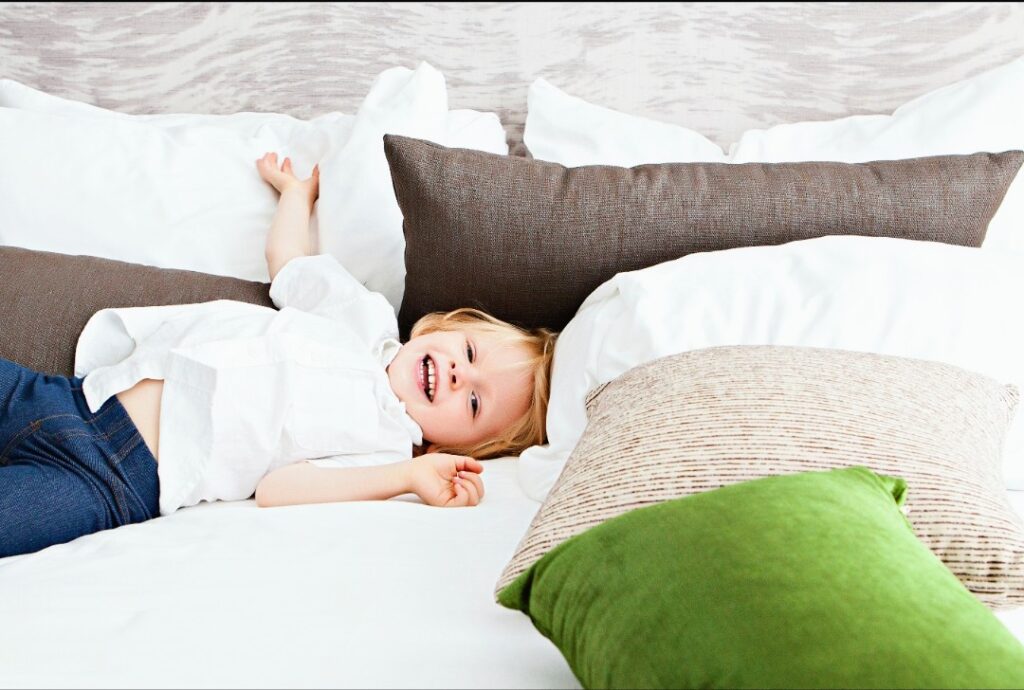Sleep is a very common issue with ASD but what do you do melatonin for autism is not working? We explore below.
There are millions of parents like us who just long for a good nights sleep.
As much as we adore our children, them waking regularly or not falling asleep in the first place can be tough to deal with.
So we go in search of answers, often coming across Melatonin.
Does Melatonin usually work?
If you trawl the internet for long enough you will find pretty much whatever answer you’re looking for.
Some people claim that melatonin is an amazing supplement, others have found it to make no difference.
In search of the truth we looked into some studies on the subject.
From what we found the short answer is yes, tests compared against placebos showed positive results.
For example, a 2019 review of 18 studies found that melatonin was better than placebo for improving both the time to fall asleep and total sleep in children with insomnia.
Another review of 234 studies found that melatonin was effective in reducing symptoms of jet lag in adults.
So it is fair to say there is some science behind the idea that it does generally help.

What about melatonin and autism?
There have been several studies on the use of melatonin in autistic children.
The results of these studies have been mixed, more so in our review than when compared to neuro-typical studies.
Overall, they suggest that melatonin may be effective in improving sleep quality and reducing sleep-related problems in autistic children.
For example, a 2018 study found that melatonin was effective in improving sleep quality in autistic children with insomnia.
Another study found that melatonin was effective in reducing sleep-related problems.
These included night waking and early morning waking, in autistic children.
So it would seem that again yes, melatonin is by and large well recognised as helping.
Why isn’t it working?
Like so much to do with autism, your child’s challenges are unique to them. There was nothing we read which promised or even indicated a 100% success rate.
For some it helped, for others it didn’t.
If you are reading this article it seems like you are in the latter group.
What can parents do?
This is the crux of the matter, what can you try in order to help your child with their sleep?
Stick to a routine
A lot of autistic children find comfort in routine and bed time is no different.
Try to carve out a routine and stick to it every day. It could be along the lines of pyjamas on, milk while watching TV, teeth brushing, read them a book in bed, then lights off.
If your child realises that there is a pattern and sleep is a part of that, you could find success.
Make their bed and room conducive to sleep
There are various adaptations that can be made such as blackout blinds for a start.
Sometimes children can like white noise in the background such as a fan, or a white noise machine.
There are also things you can add to their bed such as compression sheets, weighted blankets or rolled edges.
Keeping their room at the right temperature for them is also important.
It may be a case of trial and error but you may find something which eases the process.
Be strong when they wake up
If your child wakes up in the night try and not get into the routine of them joining you in bed.
This can be hard to break and lead to reduced sleep for all parties in the long run.
Perhaps have a default routine for when they wake such as re-reading a story to relax them.
Limit stimulation before bed
Following on from the concept of routine, try to avoid overstimulating your child before bed.
Too much screen time has been shown to have a stimulating effect, likewise obviously them tearing around the house.
Whatever activities you opt for, try to make them as soothing as possible before bedtime.
Summary – Autism And Melatonin Not Working
Melatonin has been proven to help a number of people with sleep, but it is not a miracle supplement.
If the melatonin is not working for your child with autism then other tactics will have to be tried.
Making small changes to their bedroom can make a big difference so a process of trial and error should be employed.
By sticking to routines and making those adaptations, in time your child’s sleep should improve.
Good luck.


It’s rubbish. We read online how melatonin would be great for our autistic child but we may as well have been giving him sugar pills.